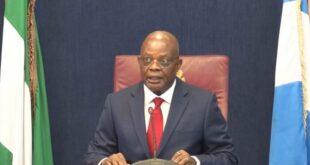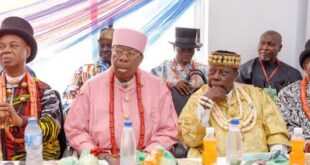By Young E. Freeborn, Warri
Delta State government has said it may consider investment in electric vehicles for mass transportation to mitigate the impact of fuel subsidy removal on the citizens.
The state governor, Rt. Hon. Sheriff Oborevwori, stated this after inspecting and test-driving two electric vehicles presented by Ajaere Motors and Jet Motor Company at Government House, Asaba.
He said he was putting up a committee to be headed by secretary to the state government, Dr Kingsley Emu, to look into the economic viability and operational sustainability of electric vehicles in Nigeria.
“This is the first time I have the opportunity to drive electric vehicles and you can see that it’s smooth, noiseless and comfortable. And with the way the price of fuel is going up, electric vehicles are better at this time because everybody is trying to move away from fuel to save cost.
“The Electric Vehicles (EV) are cheaper; the only thing is that we are still studying this model and we are coming out with our own decision very shortly, to know whether to go in that direction, especially with the present hike in petrol price.
“Everybody is trying to go in that direction. It will also be economical and the good thing about this is that, I am putting together a team headed by the secretary to the state government, to understudy this and see if it is something the state can do to support the transporters and reduce cost of transportation,” he said.
Also speaking, chairman of Jet Motors, Chidi Ajaere, noted that investing in electric vehicles was the way to go considering that the vehicles were eco-friendly and cheaper to manage.
He said future-thinking companies are investing in electric vehicles as the cost of transportation has become so high due to the rising cost of fuel and maintenance.
Ajaere said: “The Federal Government is already taking the initiative of investing in electric vehicles. We have abundance of sun in Nigeria, so the idea for the Federal Government and the Delta State government is looking into building solar powered charging infrastructure.
“The two biggest cost drivers for transportation is cost of maintenance and cost of fueling, but with electric vehicles, you eliminate the cost of maintenance and the cost of petrol thereby reducing the cost of transportation by almost 80 percent.
“The life span of the battery is about eight to ten years and the bigger vehicles can do about 300km on a full charge; that’s like moving from Lagos to Ibadan and back to Lagos or from Asaba to Warri and back to Asaba.
“All we need is just the Federal Government building solar charging stations along the way for these vehicles when travelling a longer distance so that when the passengers come down to ease themselves like they usually do, you can plug in your car to charge for some time before continuing your journey.
“In the rainy season, the solar charging infrastructures will have batteries that would store power for these vehicles to charge on gloomy days like this.
“Those stations can also be attached to CNG powered lines to help charge vehicles during the rainy season,” he said.
 PH Mundial – Port Harcourt Online Newspaper News Across The Region
PH Mundial – Port Harcourt Online Newspaper News Across The Region





